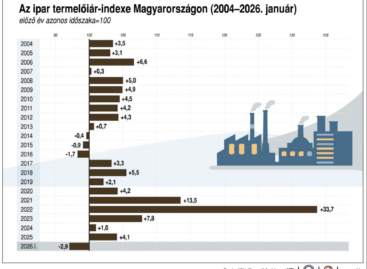GKI analysis: We are further away from eurozone membership than we were 10 years ago
Hungary committed to adopting the euro when it joined the European Union. Below, we analyze the fulfillment of the four key criteria required for joining the eurozone.
The budget deficit exceeded the 3% of GDP required by the criterion every year between 2004 and 2011. After that, a prudent budget policy was pursued between 2012 and 2019; and the deficit criterion was met at that time. The period of fiscal discipline in our country ended with COVID: the domestic deficit more than doubled the criterion every year between 2020 and 2023, but it remained around 5% in 2024. The rather optimistic 2025 budget set a deficit target of 3.7%.
According to the criterion, public debt should not exceed 60% of GDP, or if it is higher, it should approach it. Between 2004 and 2011, not only did it not approach the magic 60%, but it increasingly moved away from it. A trend reversal occurred in 2012 (made possible by the nationalization of the vast majority of private pension fund assets, which amounted to 10.5% of GDP at the time). Subsequently, due to the extremely low international and domestic interest rates, the public debt ratio gradually decreased, and we met the relevant criterion. As a result of the coronavirus crisis, the ratio jumped, and since then only a slight decrease can be observed in the indicator. Overall, nominal public debt has doubled since 2010, and GDP is proportionally at the 2017 level.
Related news
How does the forint exchange rate affect consumer prices?
🎧 Hallgasd a cikket: Lejátszás Szünet Folytatás Leállítás Nyelv: Auto…
Read more >KSH: In January 2026, industrial producer prices were on average 2.9 percent lower than a year earlier and 0.9 percent higher than the previous month
🎧 Hallgasd a cikket: Lejátszás Szünet Folytatás Leállítás Nyelv: Auto…
Read more >Hungarian world first: AI calculator calculates how much a company will lose during the flu season and how much can be saved by using preventive technologies
🎧 Hallgasd a cikket: Lejátszás Szünet Folytatás Leállítás Nyelv: Auto…
Read more >Related news
How does the forint exchange rate affect consumer prices?
🎧 Hallgasd a cikket: Lejátszás Szünet Folytatás Leállítás Nyelv: Auto…
Read more >HELL CITY has arrived, led by Michele Morrone
🎧 Hallgasd a cikket: Lejátszás Szünet Folytatás Leállítás Nyelv: Auto…
Read more >








